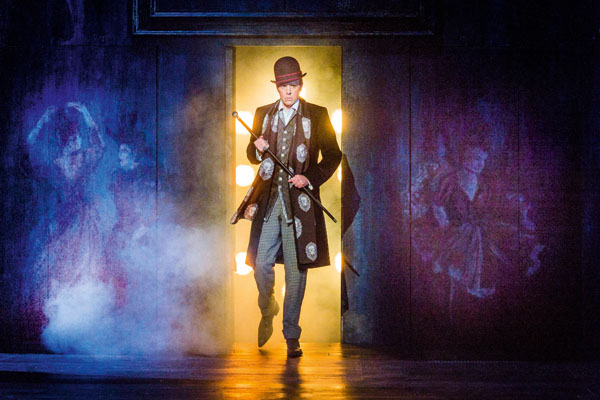About two of the operas I saw in Leeds this week there is a serious question as to whether or not they are comedies. The third, Gounod’s Faust, is clearly not meant to be; I’ll be writing about it next week. The new production of Mozart’s Don Giovanni by Alessandro Talevi is jokey and fast — or, anyway, the arias and ensembles are fast, the recitatives less so — but it’s not particularly funny, and what humour there is would certainly not have been available to da Ponte and Mozart: peasants rocking and rolling in the finale to Act I, for instance.
Talevi alternates the main action with Punch and Judy scenes, too, in a traditional little box with curtains, an idea of little merit and casting no light on the action or what kind of thing the body of the opera is. There is, in any case, the matter of whether an opera that begins with an attempted rape and a killing, and which ends with the removal of the anti-hero to hell, though not necessarily the Christian hell, with great tragic numbers en route, such as Donna Anna’s two arias, Elvira’s extremely painful appearance on the balcony (painful as much for the audience as for her), and which contains very few laughter-provoking scenes, as Figaro and even Così certainly do, can be called a comedy. Talevi invents a few laughs besides the dancing, such as Ottavio filching money from the dead Commendatore, but even that isn’t side-splitting.
After an ever-lengthening series of productions of Don Giovanni that have been dismal in assorted ways, with none that has been successful, it strikes me that what the great librettist and composer were doing was precisely testing the boundaries of what could be found funny or even tolerable on the stage. The scene of the Commendatore’s death, with both Giovanni and Leporello sounding discombobulated, is only the first of many episodes where the characters have no ready-learnt responses, and are not flexible enough to discover new ways of feeling. The last scene of all, with Donna Elvira claiming to be bound for the nearest nunnery, Donna Anna asking Ottavio for another year of grieving before she thinks of married happiness, and so on, is evidently a joke about conventionality, once the apotheosis or nadir of unconventionality, in the person of Giovanni, has been abolished: is this what life according to the rules is like?
If that is what this opera is about, Talevi doesn’t let on; with 1890s costumes for the toffs, 1960s clothes for the plebs, wedding dresses for all the Miss Havishams who assault Giovanni just before he disappears in the supper scene, Talevi seems to have no particular ideas. The timpanist has the best evening, bashing enthusiastically whenever possible, and there is a ‘period’ feel to much of the orchestral playing. The singing is decent without on the whole being outstanding, though Claire Wild as Zerlina sings her two arias beautifully, especially since she is being screwed by Masetto throughout ‘Batti, batti’.
The next evening was, by contrast, one of the great occasions: the production of Janácek’s The Makropulos Case that was unveiled at this year’s Edinburgh Festival, to rather cool reviews. Everyone was agreed about one thing, and they were right: Richard Farnes’s conducting is transcendental. The whole score is lit up, there is not a dead note, an opera that is anyway short seems to be over in a few minutes. When I think of the dreariness of ENO’s production a couple of years ago, which seemed interminable, though the singing was probably as good, it confirms yet again that the most important person is in the pit. Tom Cairns’s production, which came in for harsh words, seems to me fine: he illuminates the almost nonsensical plot to the necessary point and no further, and gives the characters strong profiles.
Ylva Kihlberg, as EM, doesn’t have the charisma of Anja Silja, but no one does. She does have glamour, though, and sings powerfully, even if I was delighted that there were surtitles for this English-sung opera. Paul Nilon, slimline and smart, makes a superb Albert Gregor, his voice just as responsive as ever. And Nigel Robson is the demented Hauk-Sendorf of the composer’s dream. Capek, who wrote the play, said it was a comedy, rejoiced in the fact that our lives are — well, I’d say very short. Janácek famously got into his stride late, and would have liked to live for a very long time, if not for ever. People’s attitudes to this matter do vary over time. Probably an opera isn’t the best place to try to settle the matter, though this one shows that it’s a good idea to air the issue in one. The music, which throbs with energy and almost angry affirmation from start to finish, and increasingly, celebrates living, while the 337-year-old (estimates, even within the opera, vary) breathes her last ecstatically. So we are left, in a performance of this stature, in the best state, one of thrilled bemusement.






Comments